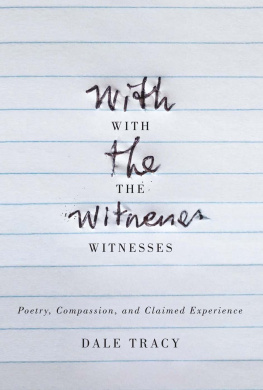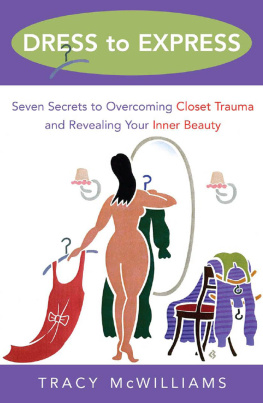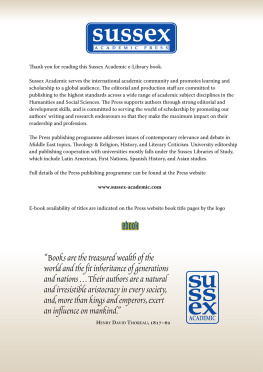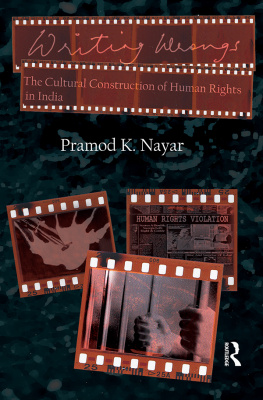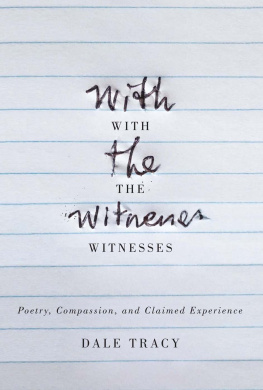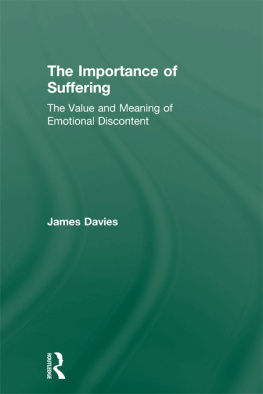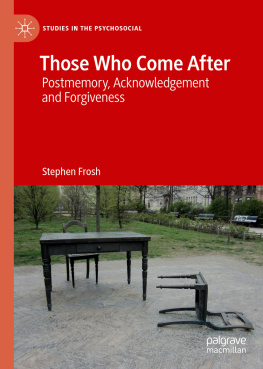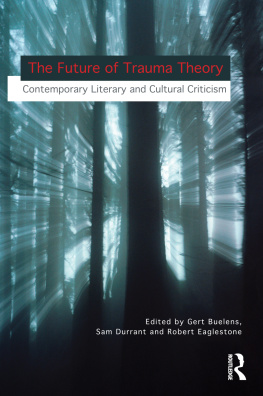
WITH THE WITNESSES
With the Witnesses
Poetry, Compassion, and Claimed Experience
DALE TRACY
McGill-Queens University Press
Montreal & Kingston London Chicago
McGill-Queens University Press 2017
ISBN 978-0-7735-5027-8 (cloth)
ISBN 978-0-7735-5028-5 (paper)
ISBN 978-0-7735-5029-2 (ePDF)
ISBN 978-0-7735-5030-8 (ePUB)
Legal deposit second quarter 2017
Bibliothque nationale du Qubec
Printed in Canada on acid-free paper that is 100% ancient forest free (100% post-consumer recycled), processed chlorine free
This book has been published with the help of a grant from the Royal Military College of Canada. Funding was also received from the Queens University Fund for Scholarly Research and Creative Work and Professional Development (Adjuncts).
McGill-Queens University Press acknowledges the support of the Canada Council for the Arts for our publishing program. We also acknowledge the financial support of the Government of Canada through the Canada Book Fund for our publishing activities.

Library and Archives Canada Cataloguing in Publication
Tracy, Dale, 1984, author
With the witnesses : poetry, compassion, and claimed experience / Dale Tracy.
Includes bibliographical references and index.
Issued in print and electronic formats.
ISBN 978-0-7735-5027-8 (cloth). ISBN 978-0-7735-5028-5 (paper). ISBN 978-0-7735-5029-2 (ePDF). ISBN 978-0-7735-5030-8 (ePUB)
1. Poetry 20th century History and criticism. 2. Memory in literature. 3. Witnesses in literature. 4. Suffering in literature. 5. Psychic trauma in literature. 6. Self-disclosure in literature. 1. Title.
PN1083.M4T73 2017 | 809.19353 | C2017-900946-X |
C2017-900947-8 |

This book was typeset in Sabon.
Contents
Acknowledgments
I first encountered the idea of witness in a course that I took at Carleton University for my masters degree. Brenda Vellinos The Proxy Witness in Twentieth-Century Human Rights Poetry challenged me; it introduced me to poems that initially I did not want to think about again once the course was over. I had found engaging with histories of injustice through the kind of reading that poetry requires closely holding each word, lingering over the sounds and rhythms of, here, accounts of suffering particularly difficult. I read these poems in as much isolation from the rest of my life as I could manage, and, when the course ended, I boxed up the books and put them in a closet until the expected scenario occurred: the thing put in some inconvenient, shut-off space will be needed again. This rule seems to work as much for mental spaces as for physical ones. I found myself returning to the box and ideas often enough that I moved the poetry onto its own bookshelf, then onto a shelf at a more convenient height, and finally onto my desk. I returned to the texts because they upset me, and what prolonged study has taught me is that whatever is most genuinely upsetting to me is the project Ill need, eventually, to take on. If self-reflection is the foundation to any scholarly work I can do, and I think it is, I cant do responsible scholarly work while avoiding what strikes me deeply.
So I would like to thank Dr Vellino for introducing me to some of the poems I study in this book. In her course I became acquainted with Peter Balakians writing as witness poetry. Although in this book I do not consider their collections within the framework of proxy witness, I also came to a few of Seamus Heaneys poems, Dionne Brands Inventory, Rachel Tzvia Backs On Ruins and Return, and Adrienne Richs An Atlas of the Difficult World in this course.
My gratitude goes to Michael Snediker and Sylvia Sderlind for their sensitive and careful guidance as my supervisory team when this book began in my dissertation. Early in the project, Sylvias comments helped me learn about how my own mind works. This insight has had many effects, but, most tangibly, I was able to affirm a less dominating relationship with the semicolon. In her role as my external examiner, Leslie Sanders provided supportive and intellectually stimulating comments that kept serving me throughout my revision process.
Thank you to Asha Varadharajan for her help with the process of preparing a manuscript. Her advice was valuable and her care was fortifying. Thanks as well to Holly McIndoe and Jeffrey Weingarten for offering clear-sighted comments as readers of some early materials.
I am grateful to McGill-Queens University Press for the support and attention during this process, and my special thanks go to Mark Abley for his perceptiveness and patience. This book is stronger thanks to its anonymous reviewers, and I appreciate their thoughtful reading and the time it took them.
I would like to acknowledge the support of the Fund for Scholarly Research and Creative Work and Professional Development (Adjuncts) from Queens University and of the Department of English at the Royal Military College of Canada. I would also like to thank my colleagues in the Department of English at RMC for creating the heartwarmingly supportive environment I have spent much of my time in as I worked on this book. My doctoral work was supported by Ontario Graduate Scholarships, William C. Leggett Graduate Fellowships, Queens Graduate Awards, and the Social Sciences and Humanities Research Council. Some of my work for this book has appeared in MaComre: Journal of the Association of Caribbean Women Writers and Scholars 14.12 (201314): 17086 as Reading Metonymically in Dionne Brands Inventory.
Every effort has been made to contact copyright holders and obtain permission to reproduce their work. I welcome any further information to include in future reprints. Seamus Heaneys poem Basket of Chestnuts originally appeared in the following publications:
Heaney, Seamus. Basket of Chestnuts. Seeing Things. London: Faber and Faber, 1991. 256.
Heaney, Seamus. Basket of Chestnuts. Seeing Things. New York: Farrar, Straus and Giroux, 1991. 267.
Thanks to my parents, Jim Tracy and Sharon Yuill-Tracy, for their enthusiastic support. Thanks to Crystal Frappier for phone calls that are always easy. A special thank you to Kris Singh who has been a constant interlocutor and supporter in all things.
WITH THE WITNESSES
Introduction
With the Witnesses proposes a theory of compassion developed through twentieth- and twenty-first-century witness poetry, a genre that I define as poetry responding to social suffering and atrocity. This body of poems offers strategies for responding to suffering. Central to these strategies and the resulting theory of compassion is the recognition of distance in response. Metonymy is the key trope signalling this distance in witness poetry. As a trope that defers meaning contiguously, metonymy evokes witness as engagement with suffering that comes across various distances and compassion as response to suffering that involves feeling with (rather than as) another. As an investigation into a theory of compassion that emerges through witness poetry, this book is not a biographical investigation of poets corpuses. Instead, With the Witnesses privileges the contiguities among global Anglophone witness poems. These poems respond to diverse atrocities and conflicts, as well as national and transnational contexts of marginalization.
Next page
